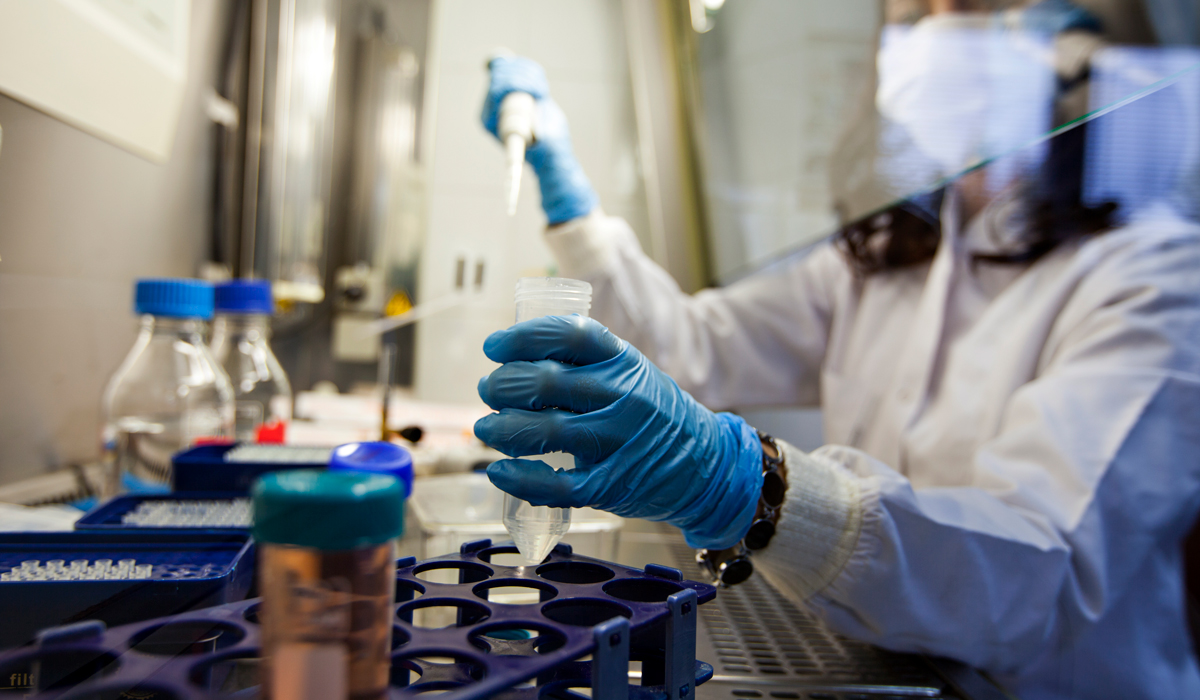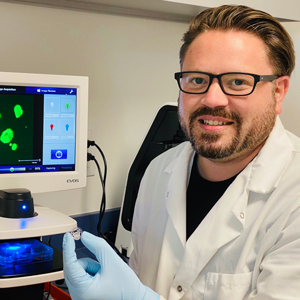
UBC researchers are investigating a novel aerosol treatment to stop the virus from replicating and limit progression of the disease
Nearly two years into the global pandemic, there remain a handful of approved therapies to treat COVID-19.

Dr. Dermot Kelleher
And with emerging variants threatening the effectiveness of existing vaccines, there is an ever-pressing need to find new treatment approaches to fight the disease.
At UBC’s faculty of medicine, researchers Dr. Dermot Kelleher and Dr. Shane Duggan are tackling this challenge head on, redirecting elements of their groundbreaking research on esophageal disease to develop a novel aerosol treatment for COVID-19.
“The global effort to intervene in the spread and severity of COVID-19 has produced several effective vaccines, but there is still a pressing need for new treatments for people who contract the virus and to safeguard the health and well-being of those who are most vulnerable to disease transmission,” says Dr. Kelleher, dean of the faculty of medicine and vice-president, health at UBC.
The proposed therapy—set to be delivered to the lungs as an aerosol using a handheld nebulizer—would be designed to stop the virus from replicating, halting the progression of COVID-19 in an effort to reduce harmful health effects and save lives.
“The global effort to intervene in the spread and severity of COVID-19 has produced several effective vaccines, but there is still a pressing need for new treatments for people who contract the virus and to safeguard the health and well-being of those who are most vulnerable to disease transmission.”
Dr. Dermot Kelleher
The researchers are hopeful that the treatment could help reduce hospitalizations and one day delay or even eliminate the need for mechanical ventilators for patients who contract the disease. They also see great potential for the therapy to be used as a prophylactic, or preventative treatment, capable of temporarily reducing the risk of infection and protecting healthcare workers on the frontlines as well as others at increased risk.
“This is an excellent example of the world-class biomedical research taking place at UBC’s Academy of Translational Medicine (ATM),” says Dr. Poul Sorensen, director of the ATM. “The ATM is a powerful innovation hub dedicated to accelerating the translation of scientific discoveries into clinical practice, rapidly solving some of life’s most pressing health challenges—from COVID-19 and cancer to diabetes and dementia—bringing real and lasting hope to everyone.”
“This research also nicely complements the groundbreaking work underway in Dr. Josef Penninger’s laboratory at UBC’s Life Sciences Institute (LSI), where they are examining the use of an inhalable form of the ACE2 protein to bind the virus and halt COVID-19,” adds Dr. Sorensen.
A novel approach to combat COVID-19
Within UBC’s Life Sciences Institute—the largest biomedical research institute of its kind in Canada—the research team is already hard at work in the Kelleher lab, using cutting-edge technology to identify and design molecules to target SARS-CoV-2, the virus that causes COVID-19.
Once inhaled, these specialized molecules, known as GapmeRs, would stick to the virus and degrade its DNA, thereby preventing the virus from replicating further, while limiting infection and further transmission.

Dr. Shane Duggan
Ultimately, by embracing GapmeR technology and a simple delivery system, such as a nebulizer that doesn’t rely on specialized equipment, the researchers believe their approach could represent a much more cost-effective means of combatting COVID-19 and saving lives around the world—including harder-to-reach regions.
“It’s our duty as researchers to use every tool in our toolkit to advance knowledge of COVID-19 and rapidly rethink our current treatment approaches to make a direct impact on patient lives both here in Canada and around the world.”
Dr. Shane Duggan
“Treatments based on GapmeR technology are relatively easy to manufacture and require no specialized storage or transport, which make them ideal for distributing to vulnerable communities in need,” says Dr. Duggan, a research associate in the division of gastroenterology.
In the coming months, the research team, which has recently grown to include two postdoctoral fellows with expertise in virology, will begin rapidly identifying molecular candidates with the highest chance of success. Following this, they will begin working with the live virus.
In an effort to accelerate the development of the new treatment, the UBC research team will also collaborate with a group of scientists with expertise in GapmeR technologies led by Dr. Navin Verma at the Lee Kong Chian School of Medicine, Nanyang Technological University in Singapore. Through this international partnership, the team hopes to bolster the studies needed to turn their research into a clinical reality, ultimately expediting the path from bench to bedside.
Future transformations in health
Beyond COVID-19, the treatment approach has the potential to be rapidly mobilized and tailored to fight future viral outbreaks—and could one day be used to help tackle other diseases, including some forms of cancer.
“The beauty behind this technology is that it holds tremendous potential because it’s readily translatable and scalable,” says Dr. Duggan.
But right now, with COVID-19 forecasted to remain for the foreseeable future, the research team remains focused on the current pandemic and accelerating an aerosol treatment to save lives.
“COVID-19 has already claimed the lives of millions and impacted millions more around the world,” says Dr. Duggan, who, after losing a family member to a combination of COVID-19 and liver dysfunction last year, understands the high stakes at hand more than most.
“It’s our duty as researchers to use every tool in our toolkit to advance knowledge of COVID-19 and rapidly rethink our current treatment approaches to make a direct impact on patient lives both here in Canada and around the world.”
At UBC, this is hope, accelerated.